But Samuel is gone. The 47-year-old walked out the door of his basement apartment a month ago and never came back. The story of Samuel Oliver-Bruno and the church that tried to protect him made national news.Videos of his arrest at an immigration office went viral. So did the images of religious leaders, church members and supporters locking arms as they surrounded an ICE van in a standoff that lasted hours.But there was another circle of people you didn't see that day.They were inside other churches just miles away, glued to their phones and laptops, filled with a growing sense of dread. They panicked as they watched live video of Immigration and Customs Enforcement agents handcuffing their friend and taking him into custody. They grieved when they learned he'd been deported to Mexico less than a week later. And they faced a harrowing question that's still haunting them as they prepare to spend another Christmas inside churches they're afraid to leave: Will I be next?"We are in the same situation," says Juana Tobar Ortega, who's been living in a North Carolina church for nearly 19 months. "And we see that things are getting worse."
A community shaken
One by one, the announcements of immigrants taking shelter in churches fell like dominoes across the country after President Trump took office. His administration's crackdowns triggered a new chapter in a movement that began in the 1980s with congregations across the US sheltering Central American immigrants facing deportation.Nearly two years into Trump's presidency, about 50 people are living in sanctuary inside churches nationwide, according to Church World Service.They are searching for solutions to their immigration cases and hoping ICE will stick to its policy of not arresting anyone in "sensitive locations" — schools, hospitals or houses of worship — except in extenuating circumstances.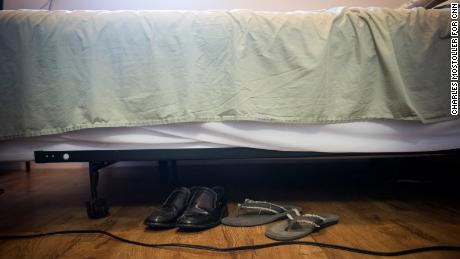 While only a sliver of churches have joined the sanctuary movement, advocates say it's growing — and North Carolina has been fertile ground.Churches in some of the state's more liberal-leaning cities led the way. Two churches in Greensboro first opened their doors. Then congregations in the Research Triangle of Raleigh, Durham and Chapel Hill followed suit.For much of this year, according to one nonprofit, North Carolina was the state with the largest number of churches hosting immigrants in sanctuary.CityWell United Methodist Church in Durham was among them. That's where Samuel Oliver-Bruno took sanctuary. His sudden arrest at a US Citizenship and Immigration Services office, where he'd been asked to give fingerprints as part of his application for deferred action, left a shaken community searching for answers. ICE says agents arrested Samuel as part of a "targeted enforcement action." He'd used a fraudulent Texas birth certificate when he entered the United States in 2014. And his case had been subject to extensive appeals since then, ICE spokesman Bryan Cox said.
While only a sliver of churches have joined the sanctuary movement, advocates say it's growing — and North Carolina has been fertile ground.Churches in some of the state's more liberal-leaning cities led the way. Two churches in Greensboro first opened their doors. Then congregations in the Research Triangle of Raleigh, Durham and Chapel Hill followed suit.For much of this year, according to one nonprofit, North Carolina was the state with the largest number of churches hosting immigrants in sanctuary.CityWell United Methodist Church in Durham was among them. That's where Samuel Oliver-Bruno took sanctuary. His sudden arrest at a US Citizenship and Immigration Services office, where he'd been asked to give fingerprints as part of his application for deferred action, left a shaken community searching for answers. ICE says agents arrested Samuel as part of a "targeted enforcement action." He'd used a fraudulent Texas birth certificate when he entered the United States in 2014. And his case had been subject to extensive appeals since then, ICE spokesman Bryan Cox said.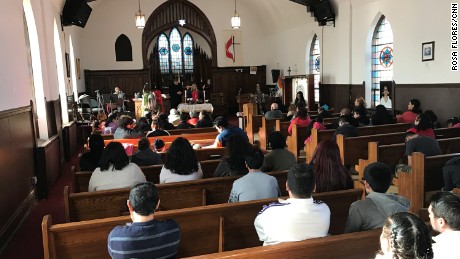 ICE has maintained that Samuel's detention and deportation were "in full accordance with federal law and agency policy." Any foreign national who's in the United States illegally is subject to arrest and removal, the agency says, no matter how long they've been living in a so-called sensitive location."Mr. Oliver-Bruno is a convicted criminal who has received all appropriate legal process under federal law, has no outstanding appeals and has no legal basis to remain in the US," Cox said.But Samuel's supporters describe him as a devoted father and husband who'd lived in North Carolina with his family for much of the last two decades. He'd been seeking a humanitarian waiver to stay in the United States to support his wife, who suffers from lupus and other serious illnesses.Authorities deported him this month.And it's not just immigrants in sanctuary who are reeling as a result. So are the churches that took them in.
ICE has maintained that Samuel's detention and deportation were "in full accordance with federal law and agency policy." Any foreign national who's in the United States illegally is subject to arrest and removal, the agency says, no matter how long they've been living in a so-called sensitive location."Mr. Oliver-Bruno is a convicted criminal who has received all appropriate legal process under federal law, has no outstanding appeals and has no legal basis to remain in the US," Cox said.But Samuel's supporters describe him as a devoted father and husband who'd lived in North Carolina with his family for much of the last two decades. He'd been seeking a humanitarian waiver to stay in the United States to support his wife, who suffers from lupus and other serious illnesses.Authorities deported him this month.And it's not just immigrants in sanctuary who are reeling as a result. So are the churches that took them in.
A seamstress mourns for her friend — and an uncertain future
Juana Tobar Ortega smiles as soon as she hears the knock on the door. She's been preparing for this moment for hours. It will be a welcome respite after weeks of grief. Ever since Samuel's arrest, she's struggled to stop crying.It's time for the posada, a traditional Latin American singing ritual re-enacting Joseph and Mary's search for shelter the night Jesus was born — with half the group playing the role of the innkeeper, and the other half playing the role of pilgrims looking for a place to stay.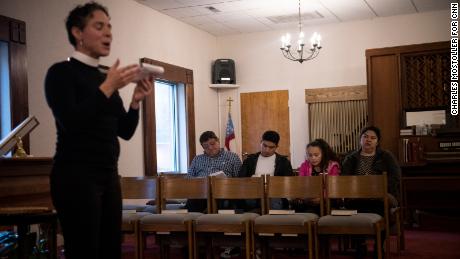 Juana and her family are the innkeepers this year. They open the door, and at first sing lyrics spurning the uninvited guests. "This is not an inn. I don't take in strangers. You might be a robber. I can't risk that danger."The symbolism isn't lost on Juana or members of the church where she's been living for nearly 19 months. Juana was the first immigrant to seek sanctuary in a North Carolina church after Trump's election. She began living at Saint Barnabas Episcopal Church in Greensboro on May 31, 2017, decades after she first came to the United States from Guatemala seeking asylum. Juana lost her asylum case, but she'd been checking in regularly with ICE since 2011. Each year, officials renewed a stay on her removal order, allowing her to remain in the country. That changed after Trump took office. When she went to her check-in that year, officials outfitted her with an ankle monitor and said she had just a few weeks to leave the country.Juana decided seeking sanctuary was her only option. Saint Barnabas opened its doors and welcomed her.Just like Juana does at the end of today's song:"Enter, enter, holy pilgrims, holy pilgrims. Welcome to my humble home. Though it's little I can offer, I can offer, all I have, please call your own."Christine Merriman loved seeing Juana at the door, letting visitors in. A church member who's spent hours by Juana's side as part of a rotation of volunteers who stay with her, Merriman says only one thing was missing."We should have built a border wall out of cardboard blocks," she says, "then knocked it down."Juana laughs."Maybe next year we can," she says.Then she pauses.This is her second Christmas in sanctuary. She hopes she won't be here for a third. But she's afraid she will.She never thought she'd be here this long. The 46-year-old seamstress lives in a narrow room with concrete walls covered with artwork her grandchildren covered in words of encouragement: "USA is a free country.""We know your not leaving.""If unicorns love each other, we all love each other."
Juana and her family are the innkeepers this year. They open the door, and at first sing lyrics spurning the uninvited guests. "This is not an inn. I don't take in strangers. You might be a robber. I can't risk that danger."The symbolism isn't lost on Juana or members of the church where she's been living for nearly 19 months. Juana was the first immigrant to seek sanctuary in a North Carolina church after Trump's election. She began living at Saint Barnabas Episcopal Church in Greensboro on May 31, 2017, decades after she first came to the United States from Guatemala seeking asylum. Juana lost her asylum case, but she'd been checking in regularly with ICE since 2011. Each year, officials renewed a stay on her removal order, allowing her to remain in the country. That changed after Trump took office. When she went to her check-in that year, officials outfitted her with an ankle monitor and said she had just a few weeks to leave the country.Juana decided seeking sanctuary was her only option. Saint Barnabas opened its doors and welcomed her.Just like Juana does at the end of today's song:"Enter, enter, holy pilgrims, holy pilgrims. Welcome to my humble home. Though it's little I can offer, I can offer, all I have, please call your own."Christine Merriman loved seeing Juana at the door, letting visitors in. A church member who's spent hours by Juana's side as part of a rotation of volunteers who stay with her, Merriman says only one thing was missing."We should have built a border wall out of cardboard blocks," she says, "then knocked it down."Juana laughs."Maybe next year we can," she says.Then she pauses.This is her second Christmas in sanctuary. She hopes she won't be here for a third. But she's afraid she will.She never thought she'd be here this long. The 46-year-old seamstress lives in a narrow room with concrete walls covered with artwork her grandchildren covered in words of encouragement: "USA is a free country.""We know your not leaving.""If unicorns love each other, we all love each other." 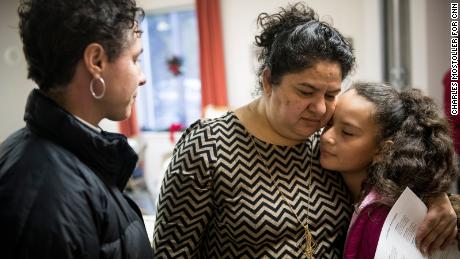 Sewing and art projects help Juana pass the time. Her four children, two grandchildren and other family members often visit on weekends. But when they're gone, depression sinks in.And in the last few weeks, she says, grief has overwhelmed her. She spoke with Samuel on a weekly conference call for people in sanctuary. She'd heard how excited he was about moving forward with his case. He told the group he was doing it for all of them, not just for himself. His arrest was a chilling reminder of a reality she'd hoped was changing."There is no mercy at all for us," she says. For Juana, seeing how many people supported Samuel was the only blessing. It helped her remember she's not alone.
Sewing and art projects help Juana pass the time. Her four children, two grandchildren and other family members often visit on weekends. But when they're gone, depression sinks in.And in the last few weeks, she says, grief has overwhelmed her. She spoke with Samuel on a weekly conference call for people in sanctuary. She'd heard how excited he was about moving forward with his case. He told the group he was doing it for all of them, not just for himself. His arrest was a chilling reminder of a reality she'd hoped was changing."There is no mercy at all for us," she says. For Juana, seeing how many people supported Samuel was the only blessing. It helped her remember she's not alone.
A pastor waits in sanctuary, praying for a way out
José Chicas flips open his laptop, logs into Facebook and gets ready to hit record. It's almost 4 a.m. — time for the daily prayer he broadcasts to the world. Behind him, newspaper articles on the wall tell the story of a preacher who's been separated from his flock."Pastor José Chicas abandonado en santuario," one headline reads. Pastor José Chicas abandoned in sanctuary.This isn't José's church. Facing a deportation order after years of checking in with ICE, the 53-year-old pastor left the pulpit at Raleigh's Iglesia Evangelica Jesus el Pan de Vida in June 2017 and — with the Rev. William Barber's help — took shelter inside the School for Conversion, a small house on the grounds of a Durham Baptist church. 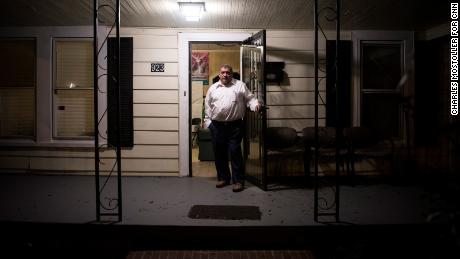 "That church can be your sanctuary until it is worked out in the courts," Barber told a rally last year. "Let them come into the house of God and try to seize a child of God!"In a strip mall storefront some 30 minutes away, José's wife is trying to keep their evangelical church afloat on top of her job on the cleaning crew at a local university. But the congregation's ranks have thinned. Some didn't like the idea of a woman preaching. Others felt José's case was taking too long. So now, Pastor José prays online in live videos shared with anyone who will listen.He sways in his seat and taps his foot on the floor as he asks God for help — for marriages that are suffering, for people who haven't found Jesus yet, for those who have strayed.José believes in redemption. Using drugs and alcohol put him on a dangerous path, he says — one that led to a conviction for DUI and domestic abuse. But those days, he says, are long ago. He draws on them to shape his sermons but says he's a changed man. "I was lost. I will never forget that day, February 28, 2002. I changed my life," he says in this morning's prayer.His voice crescendos with each sentence. This is a story he never tires of telling."I never touched a beer or a cigarette again," he says, "because Christ changes man."He misses preaching from the pulpit. Tomorrow dozens of people from his Raleigh congregation will visit for a Christmas dinner. He's been counting the days. He has gifts for all of them wrapped in his room.This morning, the screen says only one person is watching. But José knows with each passing minute, his online flock will grow. He prays for his 11-year-old son, who's been suffering from a stomachache and struggling in school. He prays for members of his church and for people who've posted on his Facebook wall asking for help. He prays for migrant caravans, for the Venezuelan people, for people facing violence in his native El Salvador. He prays for his neighbors and the city that's supporting him.But those aren't the only people on his mind.
"That church can be your sanctuary until it is worked out in the courts," Barber told a rally last year. "Let them come into the house of God and try to seize a child of God!"In a strip mall storefront some 30 minutes away, José's wife is trying to keep their evangelical church afloat on top of her job on the cleaning crew at a local university. But the congregation's ranks have thinned. Some didn't like the idea of a woman preaching. Others felt José's case was taking too long. So now, Pastor José prays online in live videos shared with anyone who will listen.He sways in his seat and taps his foot on the floor as he asks God for help — for marriages that are suffering, for people who haven't found Jesus yet, for those who have strayed.José believes in redemption. Using drugs and alcohol put him on a dangerous path, he says — one that led to a conviction for DUI and domestic abuse. But those days, he says, are long ago. He draws on them to shape his sermons but says he's a changed man. "I was lost. I will never forget that day, February 28, 2002. I changed my life," he says in this morning's prayer.His voice crescendos with each sentence. This is a story he never tires of telling."I never touched a beer or a cigarette again," he says, "because Christ changes man."He misses preaching from the pulpit. Tomorrow dozens of people from his Raleigh congregation will visit for a Christmas dinner. He's been counting the days. He has gifts for all of them wrapped in his room.This morning, the screen says only one person is watching. But José knows with each passing minute, his online flock will grow. He prays for his 11-year-old son, who's been suffering from a stomachache and struggling in school. He prays for members of his church and for people who've posted on his Facebook wall asking for help. He prays for migrant caravans, for the Venezuelan people, for people facing violence in his native El Salvador. He prays for his neighbors and the city that's supporting him.But those aren't the only people on his mind.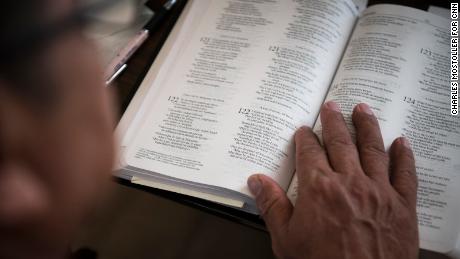 He also prays for Samuel, whose photo still hangs on the wall in the next room, beside pictures of other immigrants in sanctuary.Activists once had dubbed them the "NC Sanctuary 6." They became the "NC Sanctuary 5" after a court let one of them leave the church where he'd been living.And now there are four.José applied for the same humanitarian protection as Samuel. He doesn't know why Samuel was the first to get a letter from immigration officials, asking him to come in for an appointment. José knows he could have been the one who ended up in the back of an ICE van the day after Thanksgiving. Watching video of the arrest made his heart sink."Make a miracle, Lord, for my brother Samuel … have mercy. He was just deported to Mexico, blessed father."The prayer doesn't end there. José also prays for the officials who deported Samuel. He knows firsthand how God's power can transform people. "Lord, hallelujah, have mercy, touch these immigration officers. … Touch them. Change them," he says. "Blessed God, we are not criminals, father." He pauses to wipe away tears welling up in his eyes, then keeps praying.
He also prays for Samuel, whose photo still hangs on the wall in the next room, beside pictures of other immigrants in sanctuary.Activists once had dubbed them the "NC Sanctuary 6." They became the "NC Sanctuary 5" after a court let one of them leave the church where he'd been living.And now there are four.José applied for the same humanitarian protection as Samuel. He doesn't know why Samuel was the first to get a letter from immigration officials, asking him to come in for an appointment. José knows he could have been the one who ended up in the back of an ICE van the day after Thanksgiving. Watching video of the arrest made his heart sink."Make a miracle, Lord, for my brother Samuel … have mercy. He was just deported to Mexico, blessed father."The prayer doesn't end there. José also prays for the officials who deported Samuel. He knows firsthand how God's power can transform people. "Lord, hallelujah, have mercy, touch these immigration officers. … Touch them. Change them," he says. "Blessed God, we are not criminals, father." He pauses to wipe away tears welling up in his eyes, then keeps praying.
Sanctuary's somber side
For immigrants living in churches, the public side to sanctuary is only part of the picture.Yes, beautiful friendships are formed between people who never realized how much they had in common. And new groups of advocates step up to take a stand. But after the fanfare of the first few days, the press conference, the push for community support, there is another side to sanctuary– a painful reality made even more acute by Samuel's arrest.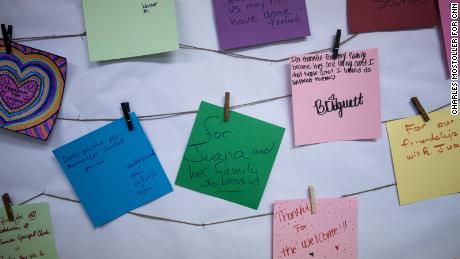 The Monday mornings alone when loved ones have left and pews are empty.The sleepless nights and the crushing desire to stay in bed.The lack of privacy and the fear of being alone.The buoyancy of feeling embraced by strangers and the devastation of feeling abandoned by friends.The constant search for a way out. The fear it may never come.
The Monday mornings alone when loved ones have left and pews are empty.The sleepless nights and the crushing desire to stay in bed.The lack of privacy and the fear of being alone.The buoyancy of feeling embraced by strangers and the devastation of feeling abandoned by friends.The constant search for a way out. The fear it may never come.
Facing questions he doesn't know how to answer
With his children by his side, Eliseo Jimenez joins his church in prayer."Every month we need healing," the congregation says in unison, "but December can be the hardest time of year." This will be Eliseo's second Christmas in sanctuary. He's been living here almost 15 months.Being separated from his children each week is devastating. There's a white board on the wall of his bedroom where his kids — 6-year-old Allison and 5-year-old Christopher — like to doodle when they come to visit. "I love you dad," Allison wrote. "Me too," Eliseo replied.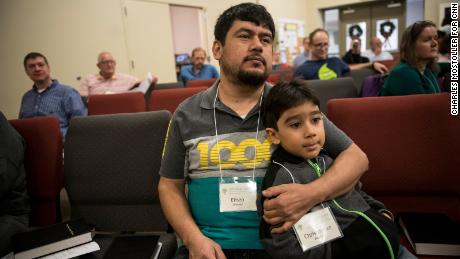 But being with his kids is hard, too. Allison asks questions he's not sure how to answer. Why can't he go to the park to play with them? Why doesn't he go home with them on Sunday nights? Eliseo tries to change the subject. He doesn't want to ruin their childhood.When they visit, they spend most of their time playing inside. Eliseo's skittish being outdoors, even in the church parking lot. "I have to be on the lookout for any strange car or any person," he says. "It's always the fear to go outside and be distracted playing with the kids, and there might be somebody."The 40-year-old undocumented immigrant from Mexico has lived most of his life in the United States. He was deported once in 2007. And since October 2017, he's been living here, in Umstead Park United Church of Christ in Raleigh, to try to keep that from happening again. Samuel's picture is on a bulletin board near the room where Eliseo sleeps. About a year ago, Samuel visited Eliseo, asking for advice before going into sanctuary.Find something to do around your church, Eliseo told him, "fixing, cleaning or helping anybody possible with anything."That, Eliseo says, is what's kept him sane.Today, as he sits in the church's second row, Eliseo looks with pride at something he built that's on display behind the pulpit — a miniature replica of the stable where Jesus was born.The children's director mentions it as she calls kids to the front of the room for their portion of the Sunday service."During this season we like to talk about hope and peace," Peg Arcari says. "We can talk about spreading joy. If somebody says they need help, we should share and be kind to one another." As the children circle around her, Arcari points to Eliseo's work."By creating this stable," she says, "Allison and Christopher's dad spread some joy."
But being with his kids is hard, too. Allison asks questions he's not sure how to answer. Why can't he go to the park to play with them? Why doesn't he go home with them on Sunday nights? Eliseo tries to change the subject. He doesn't want to ruin their childhood.When they visit, they spend most of their time playing inside. Eliseo's skittish being outdoors, even in the church parking lot. "I have to be on the lookout for any strange car or any person," he says. "It's always the fear to go outside and be distracted playing with the kids, and there might be somebody."The 40-year-old undocumented immigrant from Mexico has lived most of his life in the United States. He was deported once in 2007. And since October 2017, he's been living here, in Umstead Park United Church of Christ in Raleigh, to try to keep that from happening again. Samuel's picture is on a bulletin board near the room where Eliseo sleeps. About a year ago, Samuel visited Eliseo, asking for advice before going into sanctuary.Find something to do around your church, Eliseo told him, "fixing, cleaning or helping anybody possible with anything."That, Eliseo says, is what's kept him sane.Today, as he sits in the church's second row, Eliseo looks with pride at something he built that's on display behind the pulpit — a miniature replica of the stable where Jesus was born.The children's director mentions it as she calls kids to the front of the room for their portion of the Sunday service."During this season we like to talk about hope and peace," Peg Arcari says. "We can talk about spreading joy. If somebody says they need help, we should share and be kind to one another." As the children circle around her, Arcari points to Eliseo's work."By creating this stable," she says, "Allison and Christopher's dad spread some joy."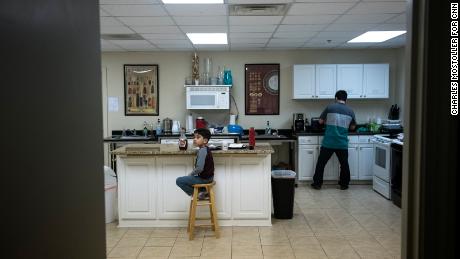 Being stuck in here over the holidays is difficult. But Eliseo says he's lived through worse. Several years ago, he spent Christmas inside the Stewart Detention Center in South Georgia, the largest immigrant detention center in the Southeast. Authorities threatened to deport him that week. They put him on a bus and said they were sending him back to Mexico. The only way he could convince someone to listen to him was by smashing his head so hard into a seat that he started bleeding. Then they double checked his files and discovered that an attorney had submitted a new petition for him to stay in the country.Eliseo was released from custody that day. He says an official told him as long as he stayed out of trouble and kept checking in with ICE, he'd be in the clear. But Eliseo says that changed for him and so many others after Trump took office. They suddenly found their work permits weren't being renewed and long-delayed deportation orders were taking effect.Since the day he left Stewart, he hasn't been able to shake the feeling of constant fear. No matter what happens with his case, he doesn't think he ever will.
Being stuck in here over the holidays is difficult. But Eliseo says he's lived through worse. Several years ago, he spent Christmas inside the Stewart Detention Center in South Georgia, the largest immigrant detention center in the Southeast. Authorities threatened to deport him that week. They put him on a bus and said they were sending him back to Mexico. The only way he could convince someone to listen to him was by smashing his head so hard into a seat that he started bleeding. Then they double checked his files and discovered that an attorney had submitted a new petition for him to stay in the country.Eliseo was released from custody that day. He says an official told him as long as he stayed out of trouble and kept checking in with ICE, he'd be in the clear. But Eliseo says that changed for him and so many others after Trump took office. They suddenly found their work permits weren't being renewed and long-delayed deportation orders were taking effect.Since the day he left Stewart, he hasn't been able to shake the feeling of constant fear. No matter what happens with his case, he doesn't think he ever will.
Haunting nightmares
The glow of holiday lights reflects on Rosa del Carmen Ortez-Cruz's face as she sits beside a small Christmas tree. In a matter of days, her children will be visiting, but she doesn't feel much like celebrating.She feels trapped inside the room where she's living. Last night she couldn't sleep. She's been crying all morning. Since she entered sanctuary at Church of Reconciliation in Chapel Hill in April, Rosa has regularly spoken with her children on the phone. Their photos hang on the wall in the converted office that's become her bedroom. "I love my babies," one picture says. But visits can be heartbreaking. It crushes her every time her children walk out the door. An immigration court in Charlotte has ordered her deportation. But Rosa is appealing. She never expected the wait for an answer would take so long.She jumps every time her phone rings, hoping her attorney is calling with news. And since Samuel's arrest, she's felt even more on edge. She's afraid to talk on the phone about her case — and afraid of what will happen next. "There's a heightened level of fear," says the Rev. Isaac Villegas of Chapel Hill Mennonite Fellowship, which rents space at Church of Reconciliation and is co-hosting Rosa in sanctuary. "We have someone at the church 24 hours a day just to make Rosa feel safer and to keep her safe."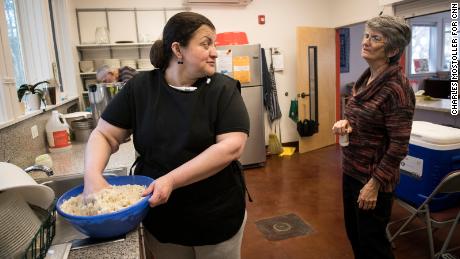 Rosa is terrified to return to Honduras, a country she fled after her partner stabbed her. She says he's threatened to kill her if she ever returns.When she does manage to sleep, a recurring nightmare haunts her. Night after night, she dreams immigration agents are chasing her.Sometimes she wishes she would fall asleep and not wake up. Then, she says, the real-life nightmare she's living would end.As Rosa tears up, Libby Johnson offers a hug. Rosa smiles. The warm embrace, and the love she's received from Libby and so many others at the church, have given her strength in her darkest hours.She's grateful God put so many good people in her path.The day Samuel was detained, Libby was one of 27 supporters who were arrested.As she rushed to the immigration office that day, she thought of the many hours she'd spent with Rosa, and how important it is to stand up for others and live the morals the church teaches."It's a call," she says. "If you really want to walk your talk, then you need to take risk."Taking a risk to help undocumented immigrants seems to be something more churches in the area are interested in doing after Samuel's arrest, Villegas says. Several new congregations have come forward to say they want to host someone in sanctuary.He tells anyone who's interested that they need to be prepared to stick it out for the long haul."This could be multiple years," he says, "because Trump won't change anything."
Rosa is terrified to return to Honduras, a country she fled after her partner stabbed her. She says he's threatened to kill her if she ever returns.When she does manage to sleep, a recurring nightmare haunts her. Night after night, she dreams immigration agents are chasing her.Sometimes she wishes she would fall asleep and not wake up. Then, she says, the real-life nightmare she's living would end.As Rosa tears up, Libby Johnson offers a hug. Rosa smiles. The warm embrace, and the love she's received from Libby and so many others at the church, have given her strength in her darkest hours.She's grateful God put so many good people in her path.The day Samuel was detained, Libby was one of 27 supporters who were arrested.As she rushed to the immigration office that day, she thought of the many hours she'd spent with Rosa, and how important it is to stand up for others and live the morals the church teaches."It's a call," she says. "If you really want to walk your talk, then you need to take risk."Taking a risk to help undocumented immigrants seems to be something more churches in the area are interested in doing after Samuel's arrest, Villegas says. Several new congregations have come forward to say they want to host someone in sanctuary.He tells anyone who's interested that they need to be prepared to stick it out for the long haul."This could be multiple years," he says, "because Trump won't change anything."
The hole he left behind
Samuel's room at CityWell is empty, but it's full of reminders of the life that was lived here and the man who is missing. Wedding photos are taped to the armoire door. Notes he took during a Duke Divinity School class are sitting on a nearby table. So is a stack of books he'd been studying. "Aprenda Inglés para Conversar" — Learn English for Conversation — is at the top. A sign on the door still says, "Oliver Family's Home."The room is still and quiet, but the church's pastor still hears Samuel's voice every time he walks by.The music minister thinks of him when he passes by the prayer room across the hall that Samuel — who'd worked for years as a drywall contractor — helped build.Upstairs in the worship hall, someone taped a sign to the wooden chair where Samuel used to sit during services."Samuel's seat," it says. "Keep praying."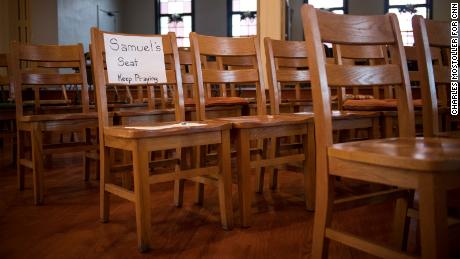 The Sunday after his deportation, Samuel sent the church a video message from Mexico. It was broadcast on TV screens during services. "Even though I am in my country, I feel afraid," he said. But he added that the North Carolina congregation was still giving him strength. "Brothers and sisters, I love you all a lot. You will always be with me. Everywhere I go I will talk about all of you, about how much love and support you gave my family." Since Samuel's arrest, CityWell pastor the Rev. Cleve May says he and others have been wrestling with tough questions about the sanctuary movement's future."One of the gambles the sanctuary movement makes is that ICE really doesn't want to kick the hornet's nest of people with privilege," May says. "If you traumatize their church, they're going to throw a real stink. The publicity of this is a deterrent to ICE."It has been thought that the public exposure of sanctuary would serve as a prophylactic to ICE aggression, that surely they wouldn't come somewhere where the light is really bright. I'm not sure we can bank on that anymore."He sees Samuel's arrest as a violation of sanctuary.
The Sunday after his deportation, Samuel sent the church a video message from Mexico. It was broadcast on TV screens during services. "Even though I am in my country, I feel afraid," he said. But he added that the North Carolina congregation was still giving him strength. "Brothers and sisters, I love you all a lot. You will always be with me. Everywhere I go I will talk about all of you, about how much love and support you gave my family." Since Samuel's arrest, CityWell pastor the Rev. Cleve May says he and others have been wrestling with tough questions about the sanctuary movement's future."One of the gambles the sanctuary movement makes is that ICE really doesn't want to kick the hornet's nest of people with privilege," May says. "If you traumatize their church, they're going to throw a real stink. The publicity of this is a deterrent to ICE."It has been thought that the public exposure of sanctuary would serve as a prophylactic to ICE aggression, that surely they wouldn't come somewhere where the light is really bright. I'm not sure we can bank on that anymore."He sees Samuel's arrest as a violation of sanctuary.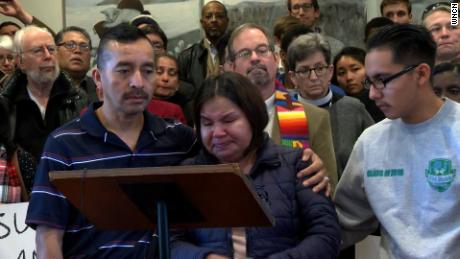 Those who went with Samuel to his appointment were praying and singing religious songs outside the immigration office. "For us it was a statement that sanctuary is not a building," he says. "It was people saying to a person, 'You belong with us and we stand with you.'"Celebrating the holidays without Samuel is difficult, May says, but darkness and joy can coexist. Grieving the loss has become part of the church's identity."The presence of God doesn't erase the presence of pain," he says. And nothing will erase the many ways Samuel shaped the church and his friends there. In worship, he says, they're still singing songs Samuel taught them.
Those who went with Samuel to his appointment were praying and singing religious songs outside the immigration office. "For us it was a statement that sanctuary is not a building," he says. "It was people saying to a person, 'You belong with us and we stand with you.'"Celebrating the holidays without Samuel is difficult, May says, but darkness and joy can coexist. Grieving the loss has become part of the church's identity."The presence of God doesn't erase the presence of pain," he says. And nothing will erase the many ways Samuel shaped the church and his friends there. In worship, he says, they're still singing songs Samuel taught them.
Original Article
[contf] [contfnew] 
CNN
[contfnewc] [contfnewc]





